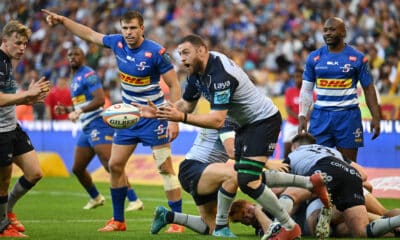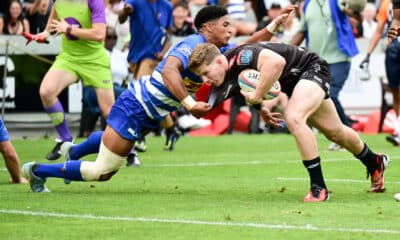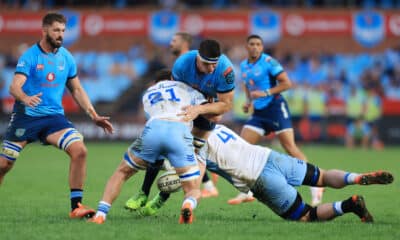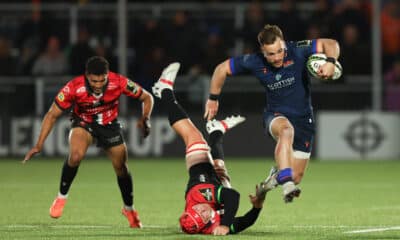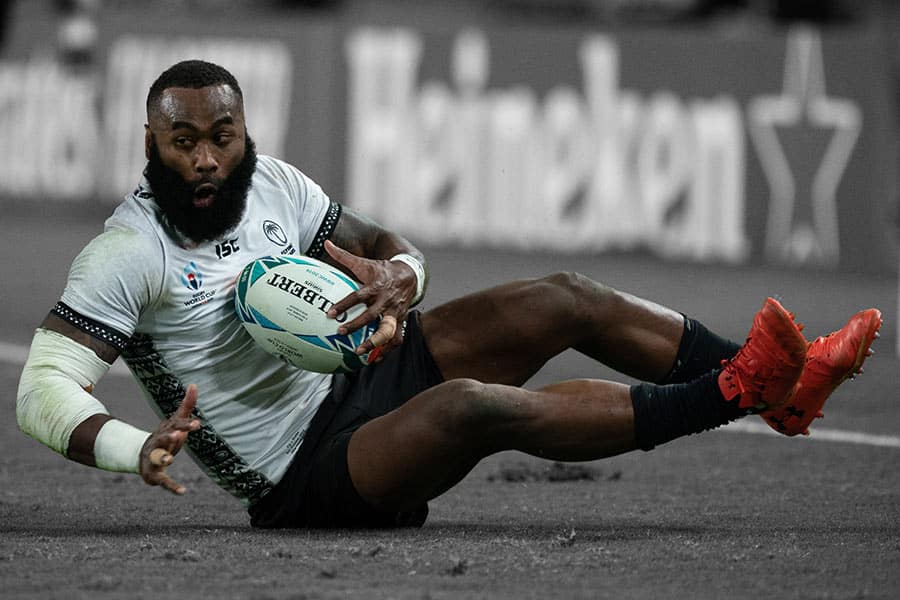
14 October 2019, by: Quintin van Jaarsveld
Top Tier 2 players at the Rugby World Cup
As fans get a moment to collect their breath and excitement ramps up for the Rugby World Cup quarter-finals this weekend, Quintin van Jaarsveld identifies the top Tier 2 players who took their careers to new heights during the pool stages.
Tier 2 nations Japan, Canada, Fiji, Georgia, Namibia, Russia, Samoa, Tonga, Uruguay and USA have it tough. Everyone loves an underdog, but that love is seemingly limited to the few weeks when the eyes of the world are on the sport for its showcase tournament.
‘Minnows’, as they’re dismissively referred to, are underappreciated and largely ignored, made to play among themselves in territorial tournaments like the Pacific Nations Cup, Africa Gold Cup and Rugby Europe Championship. As a result, progress is limited. The weaker teams are condemned to crawling, while the stronger sides take baby steps at best in the bigger scheme of things. The best earn the honour of representing their respective nations at the World Cup, where their severe lack of meaningful competition (against Tier 1 nations) during the four-year cycle building toward the global tournament is exposed.
Professional structures are improving but at such varying slow speeds that some of these nations still rock up to the World Cup with squads made up of mostly semi-professional players. It’s not a good look, but things are at least improving. Smaller nations no longer suffer demoralising triple-digit defeats on the game’s grandest stage, like Japan’s 145-17 loss to the All Blacks in Bloemfontein in 1995 and Namibia’s record 142-0 defeat to the Wallabies in Adelaide in 2003.
The weakest qualifiers are always going to take a pounding against powerhouses like the All Blacks and Springboks, that’s just an unfortunate reality. We saw this in the New-Zealand-Namibia (71-9) and South Africa-Canada (66-7) games. Generally, however, the underdogs punched above their weight commendably well during their time in the Land of the Rising Sun.
Hosts Japan are the obvious examples, having caused a seismic upset over Ireland and stormed into the quarterfinals for the first time ever, but the likes of Uruguay and Fiji also made their presence felt. Los Teros’ shock win over the Pacific Islanders was one of the highlights of the tournament, the wild celebrations from the players and coaching staff making for a heart-warming moment. Fiji, for their part, thrilled and troubled both the Wallabies and Wales, their effort against the Six Nations champions in Oita elevating the contest from predictable to pulsating.
Collective heart and special individual performances were what powered the underdogs in Japan. Stars were born, while lesser-known players became global household names after starring for their respective teams, none more so than these 10 standouts.
Much of Japan’s magical campaign, and rise leading up to it, can be credited to their talismanic captain. Leitch was one of the stars of the hosts’ 30-0 win over Russia in the tournament opener, putting in a big effort and rallying his troops.
The flanker was then surprisingly dropped to the bench for the Ireland game, which proved to be a masterstroke by coach Jamie Joseph, as the 31-year-old made a barnstorming impact after coming on in the 30th minute to help the Brave Blossoms claim a famous 19-12 win in Shizuoka.
Back in charge in the No.6 jersey, he was sensational in the 38-19 win over Samoa and immense in Sunday’s historic 28-21 victory over Scotland in Yokohama, making key tackles and strong carries to inspire the hosts to make history.
Talk about a star being born! Matsushima went from obscurity to superstardom after becoming the first Japanese player in history to score a World Cup hat-trick (and only the third from a Tier 2 country) in his electrifying Man of the Match performance against Russia.
The 26-year-old wing sensation, dubbed “Ferrari” by Joseph after the win over Russia, continued his fantastic form against Ireland, making 54 metres, a line break and beating three defenders, scored a late bonus-point try against Samoa and dotted down in another outstanding effort against Scotland.
Don’t be surprised if the Pretoria-born Suntory Sungoliath star is snapped up by a bigger club after the World Cup.
Cometh the hour, cometh the man. Matsushima’s fellow flyer was the star of the historic win over Scotland. Fukuoka scored two crucial, terrifically-taken tries either side of half-time.
Considering how slippery the ball is in Japanese conditions, his one-handed take of Timothy Lafaela’s grubber at full tilt to score his first try was breath-taking and his hunger and technique to rip the ball from the bigger Chris Harris and then hang on and canter home made his second even more impressive.
The Panasonic Wild Knights ace was a constant threat, throwing a beautiful offload to put Matsushima away, beating seven defenders, making three clean breaks and racking up an unrivalled 110 metres.
He was solid on defence as well, making seven tackles and winning two turnovers to earn himself the Man of the Match award. The 27-year-old was excellent against Ireland, too, scoring the decisive try and making a match-high 79 metres.
The embodiment of Fijian flair, rampaging Radradra was a force of nature. The winger left Japan with two Man of the Match awards – for his sterling efforts in the 45-10 win over Georgia and 29-17 loss to Wales – and under a shower of praise, ex-England flyhalf Stuart Barnes and former Wallaby fullback Greg Martin among those hailing him as the Player of the Tournament to date.
The Bordeaux back’s performance against Wales, which saw him run for 140 metres, beat seven defenders and spark two line breaks from 19 carries, was so exceptional that many, including Springbok legend Schalk Burger, called it the greatest individual performance in World Cup history.
Against Georgia, “Semi-Trailer” scored a double, racked up a tournament match-high 177 metres, made five clean breaks and set-up two tries.
Caught in a downward spiral, Ioane played his best rugby in years at the World Cup. Since his departure from the Highlanders at the end of the 2014 Super Rugby season, the loose forward’s career has slowly regressed.
He initially impressed at the Sale Sharks and made 55 appearances for his new club before being released. He took up an offer from London Irish in 2018 for who he has since been playing in the second-tier Gallagher Championship.
The World Cup was thus an opportunity for the 30-year-old to remind everyone of the exceptional workrate that put him on the map and he did just that. He was a tackling titan, making a tournament-leading 67 hits, 12 more than second-placed South African-born Japan flank Lappies Labuschagne.
The Russian revelation. Gadzhiev carried the Bears on his back, both on attack and defence, and outworked the majority of the biggest names in the sport in the process. The ever-present loose forward ranked joint-ninth in tackles with 45 and just outside the top 20 in carries with 33 at the end of the pool stages.
A natural, Gadzhiev had never touched a rugby ball when Russia made their maiden World Cup appearance in 2011. Up until then, he had been a mixed martial artist with a combat sambo base, like Dagestan’s favourite fighting son, unbeaten UFC lightweight champion Khabib Nurmagomedov.
Based on his workhorse performances, Gadzhiev, who plays for Russian club Kuban, is making up for lost time.
The flyhalf was the general of his team throughout the tournament and the star of the show in the famous 30-27 win over Fiji in Kamaishi. With the Pacific Islanders outscoring Los Teros by five tries to three, it was Berchesi’s accurate boot that was the difference between the sides and earned him the Man of the Match award.
The 28-year-old, who plies his trade for US Dax in the Pro D2 – France’s second-tier club competition – scored 15 points (three penalties and three conversions), a Teros record in a single tournament match, to guide Uruguay to their greatest-ever victory and their first World Cup win in 16 years.
A shining light for the Lelos. The hard-running loose forward was Georgia’s best ball carrier and most consistent top-class performer. Giorgadze, who plays for Top 14 club Brive, made an immediate statement in the 43-14 loss to Wales, making 31 metres and 11 tackles in a complete performance.
The 23-year-old then had a field day in the 33-7 win over Uruguay, scoring a try, making 81 metres, a clean break and beating four defenders to earn the Man of the Match award. He was a force to be reckoned with in the 45-10 defeat to Fiji as well, running for 84 metres while beating five defenders and making two clean breaks, and made a notable impact off the bench against Australia.
The yin to Otari’s yang, Beka brought the pain with his tireless tackling. The No.8’s outing in Georgia’s first-ever clash against the Wallabies in Shizuoka on Friday was one of the best defensive displays you’re likely to see. The Bordeaux back-rower mowed down Australians at every turn, making an astonishing 26 tackles.
His hunger seemingly unquenched, the 23-year-old also won five turnovers in the gutsy 27-8 loss. Given Georgia’s bruising, taxing campaign, Gorgadze’s commitment and conditioning in the Lelos’ final fixture was otherworldly.
Started by an intercept by Todd Clever some six metres from USA’s tryline, the ball found its way to the right-wing, who backed himself and burned the 2007 IRB Player of the Year. The remarkable run-in would go on to be recognised as the inaugural IRPA Try of the Year.
A diamond in the rough, Takulua showed he’s a top-class scrumhalf. If you didn’t know, now you know – the 28-year-old made sure of that as Mr Do-It-All in Tonga’s torrid campaign.
Languishing in the Gallagher Premiership, where he plays for Newcastle Falcons, Takulua put himself on the global map as the Sea Eagles’ general, playmaker and goal-kicker.
A menace in all four matches, he made 37 metres against England and Argentina, 38 metres against France and 47 metres in Tonga’s lone 31-19 win over the USA in Higashiosaka on Sunday.
He scored 23 of Tonga’s 67 points in all, including a try in the 23-21 loss to Les Bleus in Kumamoto.
MORE RUGBY

















